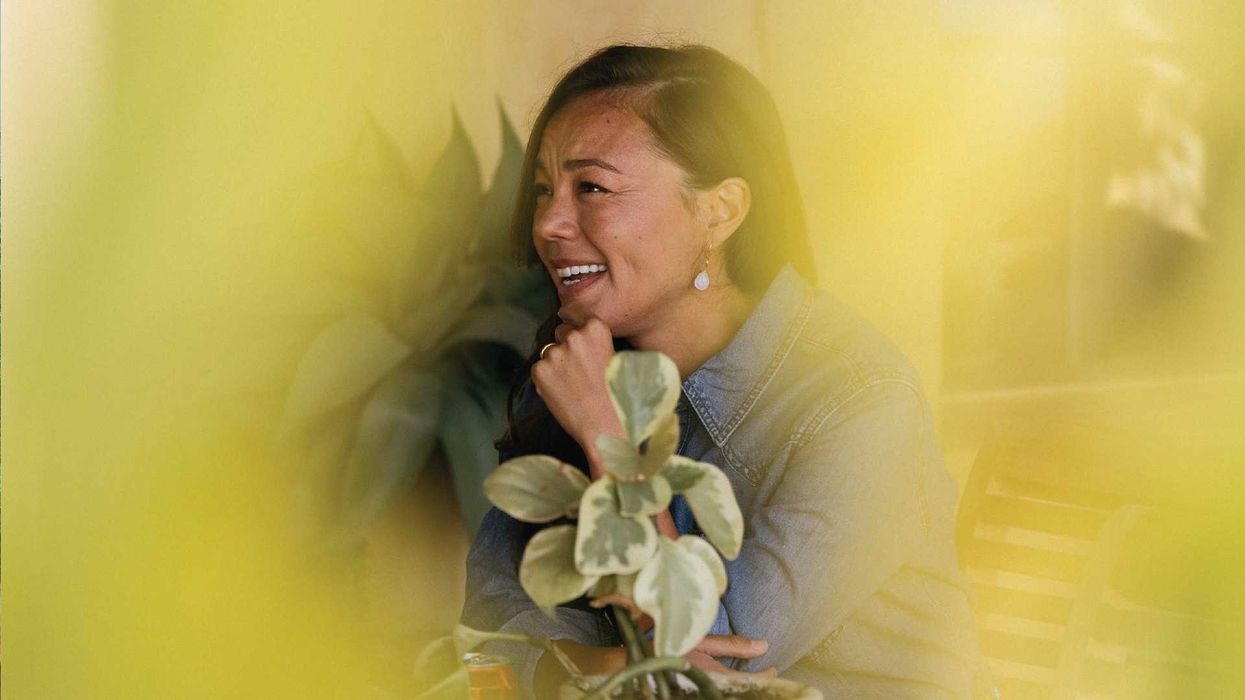
Mike Lerner

Nicole Shanahan is ready to heal America's relationship to food , tech, nature—and politics.
"Shall we go outside?” Nicole waved to the terracotta table and chairs just beyond the dining room. Not long ago, I passed through the hillside gate and up the brick drive with Frontier photographer Mike Lerner to the fountain courtyard at the entry of Nicole Shanahan’s California mountaintop home. There, we were greeted with drinks, both sparkling and still, and ushered into the warm, welcoming living room by a woman named Sutherland. There, outside was already as close as you can get indoors—the walls adorned with art, the windows expansive. Beyond the mountaintop terrace, awaiting us far below, was the Pacific.
We were received by Christina, Nicole’s gently jingling stylist and hairdresser; Jacob Strumwasser, her partner, flanked by a friend and a neighbor with matching white tees and tousled surfer hair; and, finally, Nicole herself, stunning (as Jacob observed) in the hat, boots, belt, and denim of a new kind of California oceanside rancher.
But before MAHA and MAGA, before the momentous post-COVID rise of Robert F. Kennedy, Jr., there were the contested 2020 primaries; it was then that Nicole began to deviate from the anticipated script.
All this while music played—sweet, soft, mood-setting numbers. I couldn’t tell you the artist, genre, or lyrics, but I can tell you it felt like good people lived here. Good people with important things to do. On the broad terrace of the patio, essentially a part of nature itself, Nicole opted for a 17-ounce bottle of Mexican Coke. No corn syrup, no plastic.
When people do in private what they say in public, you know what comes next will be the truth.
So I took the opportunity to crack into politics—not a place Nicole had begun in life but one into which she hadn’t hesitated to stride when the moment called for a new kind of leadership. A decade ago, her periodic donations to Democrats had matched the expected pattern in Silicon Valley circles. But before MAHA and MAGA, before the momentous post-COVID rise of Robert F. Kennedy, Jr., there were the contested 2020 primaries; it was then that Nicole began to deviate from the anticipated script.
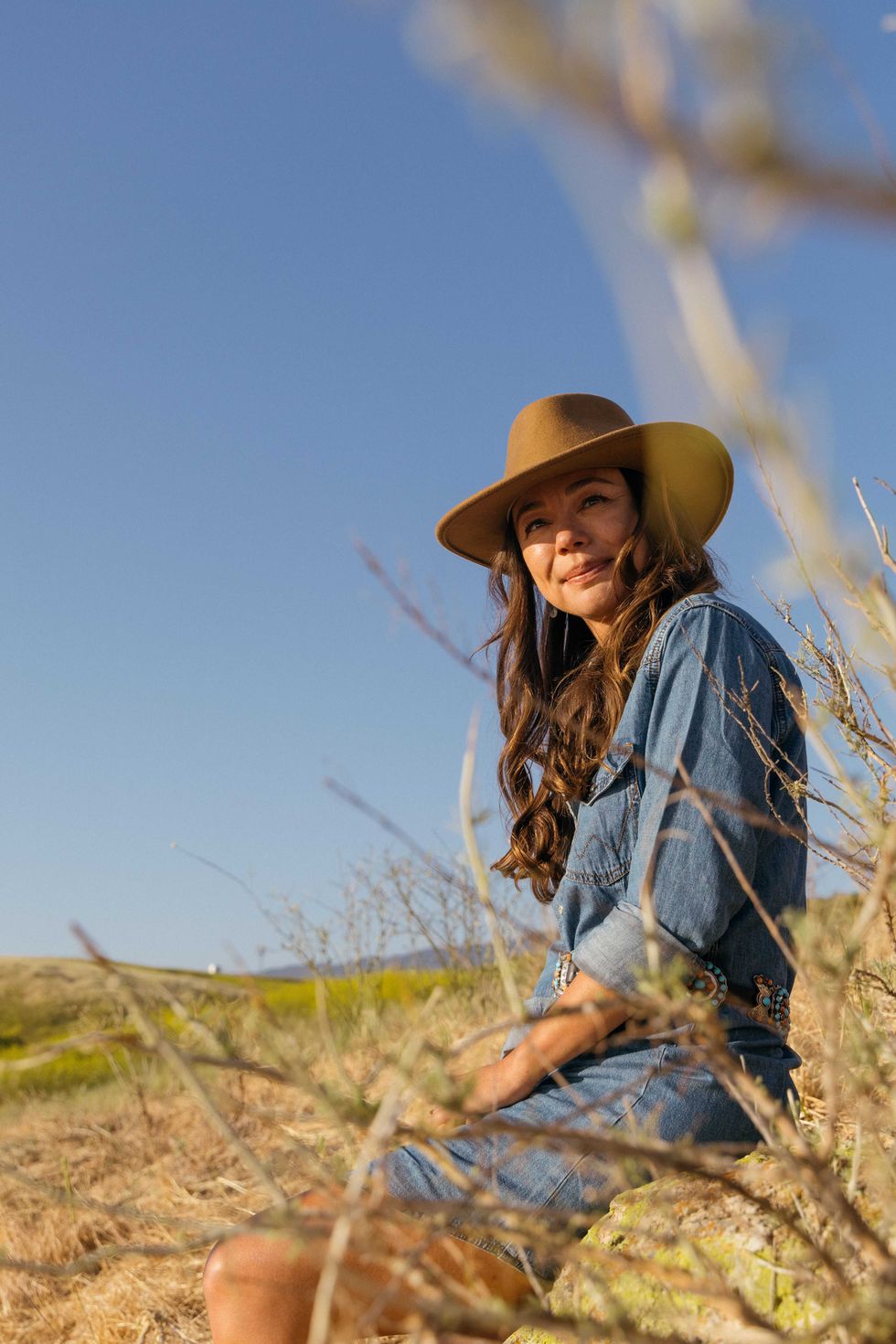
Marianne Williamson cut a striking figure on the Democrat debate stages, slicing through the standard left-wing rhetoric with a quintessentially Californian appeal to love and good vibes. To the outsider, it seemed quixotic but innocuous; to the party insider, it was a betrayal not to be brooked.
“I’m new to backing candidates that are Republican or independents. I was a life-long Democrat until this last 2024 cycle,” Nicole said. “Since Obama left office, things have gotten weird. The Bernie-Hillary saga was my first big lesson that something was very wrong with the party. Just looking at their financials, very clearly the DNC had lost a lot of money, and I later learned that Hillary’s campaign really bailed out the Democratic party.”
Nicole continued, bringing it back to Bernie’s campaign and the grassroots, groundswell support he received in 2016, particularly from young Americans who were inspired by something other than business as usual.
“I wasn’t necessarily a Bernie person at that point,” she clarified.
“But in 2016 and then certainly in 2020, it became abundantly clear this was not a party anymore. It was very much a single lineage of power brokers calling themselves Democrats. There was no internal process. There was no voice to be heard outside of this very, very small pocket of influence. You could name on one hand who that pocket of influence was in Silicon Valley and in Hollywood.”
I wasn’t sure if she was, in fact, about to name “them.” I figured it was best to see if she would of her own accord. My primary question, still unspoken, guided me from there: Why do you do it? But I wasn’t about to ask it. Not yet. No leading the witness.
“It’s a group of about twenty people,” Nicole added of the power brokers, “and they all go to Davos. It’s funny... that’s where I met George and Amal Clooney.”
It’s a small club with a lot of power, which, particularly the Clooneys, derives from the NGO-Industrial Complex. The veneer appeals to the influential—who wouldn’t want, as Amal claims to, “support women’s rights in the Muslim world”? Yet itis this very same open palm of charity that becomes the invisible hand steering the Democratic ship. And in 2020, that ship steered away from Nicole’s preferred candidate—the “different, interesting, unique” Marianne Williamson.
Nicole donated to Williamson’s primary campaign in 2020. I recalled both her and Tulsi Gabbard, the latter now President Trump’s Director of National Intelligence, delivering beautifully brutal, viral smackdowns of both Joe Biden and Kamala Harris during the debates that year.
“There was a lot of hunger for what Marianne represents,” Nicole said. She, like Bernie in 2016, was “very independent, very grassroots.” But remember 2020?
Nicole paused, as if to end the scene; her voice lowered and slowed.
“What we know about politics in America is that the people still have a chance. The people still have a voice. People still believe if they fight hard enough, their will will be done. It still exists.” Her voice became inflected with righteous anger. “To be told by this small group of people that ‘you’re unrealistic’ or ‘out of touch’ when, at that time, I was listening to the voice and the will of the people... we’re tired of this elite bullshit. The American people have called bullshit on the Democratic party for the last eight years. They’re sick of this party. They’re sick of what they did to Bernie. They’re sick of what Biden’s first term looked like. They’re sick of the lies.”
She added that even George Clooney, whom she described as the “moral authority” of the Democratic party, claimed he had been lied to about Biden’s obvious mental decline—to keep his clout, one assumes.
Nicole’s gaze returned to mine.
“To answer your question, in short, those twenty people pulling the strings...we’re over it.”
Remember, in the 1976 film Network, when the hero Howard Beale played by Peter Finch, angered by social breakdown, utters his famous call to action?
I’m mad as hell, and I’m not going to take it anymore.
That’s the energy Nicole gives off. But unlike Howard’s rage, Nicole’s spiritedness feels different. Protective. Maternal.
Mama Bear Energy. I pictured the California flag stirring to life.
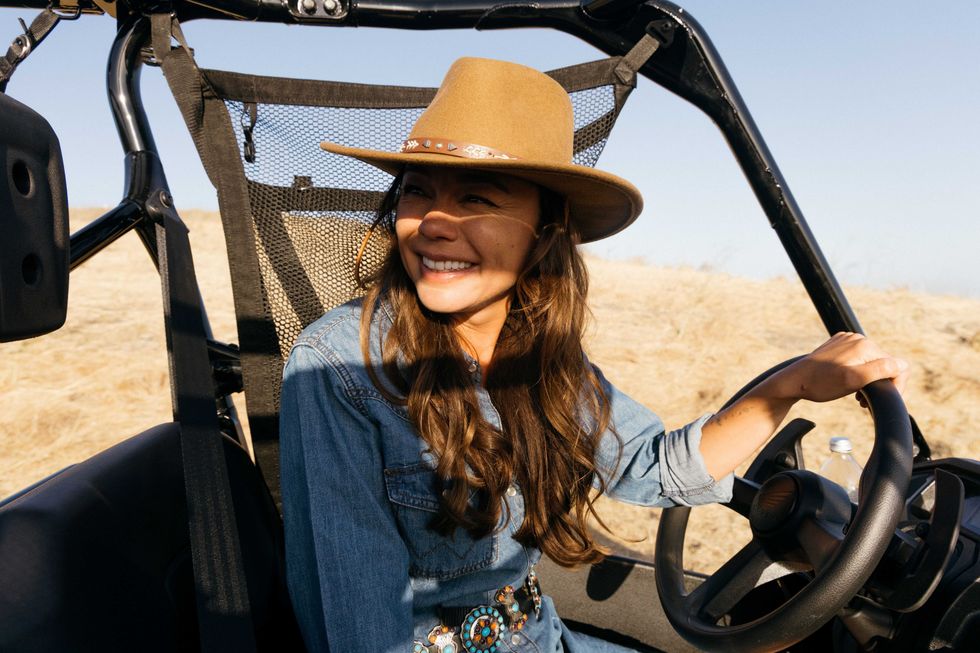
I noted that, in another interview, Nicole had once said she saw the Democrats as “the party of compassion,” of “understanding and aptitude.”
“They’re the opposite of all those things!” Nicole jumped in, laughing ruefully. “It’s really awful.”
People don’t usually awaken all at once. There’s typically a process, like dominoes falling one after the next.
“That was my first experience where I realized that there was a door so shut on any alternative candidate than what the central party wanted, it was like it was vacuum-sealed,” she said. She’d donated millions to their causes, and they slammed the door on her—all while taking her money anyway. “So I took a step back and looked myself in the mirror. ‘Am I a Democrat? Is there democracy? Is America even a free and sovereign place?’ That was the first time I asked myself those questions.”
'It's a group of about twenty people,' Nicole added of the power brokers, 'and they all go to Davos. It's funny. . . that's where I met George and Amal Clooney.'
The first domino was Marianne. Then RFK, Jr. And, finally, Donald J. Trump.
Nicole shared how her social media squad during the Kennedy run had created fantastic and fun anti-Kamala videos. And they were very easy to produce. But anti-Trump ads were harder. Because the scandals that her prior information sources told her were real, just... weren’t.
Because, as Nicole met Trump supporters, she realized something: Trump supporters are good people, and Trump is a good man. Which is why, she realized, Democratic opinion-assigners in the media attacked his character the hardest.
“I can tell you why the Left discredits Trump as being a good father,” Nicole said. “When you exploit people’s pain, you own them. You own them as voters. You own their behaviors and you own their perspective of what’s going on. They keep this population unable to see that Trump is a good father and has a paternalistic character to him; children gravitate to him because he’s a sweet grandpa.”
In that moment, I felt from Nicole a wave of empathy. So real it felt like gentle sunlight beyond the mountains.
“Something like 60 percent of the Democratic female donor base is divorced; their husbands went off to find a younger wife. These are deep wounds; it’s easy to exploit those wounds. Just make it stop.”
Where had I heard that before?
One of those interviews. It was about the war in Gaza. On the campaign trail last summer. She’d been asked what her views were on Middle Eastern strife.
I remembered.
“I just want it to stop,” Nicole had said. “Just make it stop.”
That’s it.
That’s why she does it.
Nicole Shanahan went from donor to candidate to do something about Democratic party corruption—just make it stop.
She underwrote the most consequential, truly nonpartisan sociopolitical movement in modern history—Make America Healthy Again—to cleanse the rot from Big Pharma and Big Food—just make it stop.
She’s shown the way for educated and otherwise liberal women to find an alternative to the wounds that scar and become feminism—just make it stop.
“I’m not a feminist,” Nicole said a little later on in our talk. She explained why she used to be. “I was in my early 20s, and I didn’t get the job promotion I wanted. I didn’t get the recognition I wanted for my work. Men would steal my work and pass it off as their own. ‘I hate this. This just seems so unfair.’”
Now, feminism means different things to different people, and there have been four waves of it over the last century and a quarter—extending from women’s suffrage to the recognition of transgender individuals. From Nicole’s context, from her story, I sensed she had a different definition.

“You’re saying that modern feminism is a reactionary feeling of justified resentment and envy. ‘You have the thing I worked for. You’re a thief, and you’re being rewarded.’ Which is obviously unjust.”
“That’s exactly it,” Nicole nodded. “Now that I’m studying Scripture, I realize that attitude blocks out fatherly love. Your god becomes feminism; your god is no longer this benevolent, fatherly creator. Feminism is the rejection of all things paternalistic.”
As a little girl, Nicole did not know a benevolent, fatherly presence. She shared in detail some of her first memories and shed a few tears. Hers was a home without peace. Her mother did the best she could.
“There was a rock,” she said. “I would run away to this park. I would sit with my back to the rock, and I would just pray. I would just ask God—I didn’t have a very well-formed description of God, but I knew there was a God—and I would just pray.”
“What would you pray?”
“Get me out of Oakland.” Nicole turned and visor-handed her forehead to see a little way off from the terrace. She pointed out a rock, maybe a little smaller than an exercise ball. “The rock was like that guy over there. He’s bigger.”
What she said next broke this father’s heart. I tried not to show it; this was her time. “It took me about ten minutes to get there on foot,” Nicole said of the runaway park. “The first time I ran away, I was probably... four.”
Oakland, California. A four-year-old child. Alone. Ten minutes away. Hiding.
She brought me through several sobering episodes of her childhood, then into her teen years, when the possibility of college seemed to be the only answer to her first prayers.
“I still remember the night before I was to take the SAT exams. It was supposed to be a sacred coming of age. It was my biggest opportunity.”
But her precious study time was violated by alcohol, yelling, and loud music.
“It went on ‘till one in the morning. Then two. Then three. All I could say in my head was, ‘Please... just make it stop.’ It’s such a similar feeling watching the destruction of these pregnant mothers. They’re getting poisoned by the mRNA vaccine. Pull the jab. Let people live their sacred existence.” Nicole’s visible grief rose into resolve. “This is personal. Just make it stop.”
That’s why she does it.
“Mama Bear Energy,” I said, aloud this time.
“Our path forward for humanity has these very narrow moments,” Nicole’s tone evened out. “Just like that SAT. I had one shot to get out of Oakland, to get out of a hellish household situation. Pregnant moms get one opportunity to bring a baby in healthy; they get nine months. We have narrow opportunities to make the right choices in our own lives, and if we’re lucky enough, we can help more than just ourselves.”
“What are the other narrow moments for humanity right now?” I asked.
“Soil and agriculture. Geoengineering. We need a moratorium on the mRNA platform. Protecting our oceans. Once our water and air are polluted... what I’ve learned in life over and over again is that it’s hard to regenerate something that has been harmed. It’s easy to hurt an ecosystem; it’s very hard to repair. It’s easy to damage a child during their development. It’s very hard to heal them.” She looked out at the ocean. I wondered if she was calculating how many tons of microplastics were contained in the water currently visible to us. “Destruction is easy. Repair is hard.”
As if to underscore the point, the sun, marking time, had shifted.
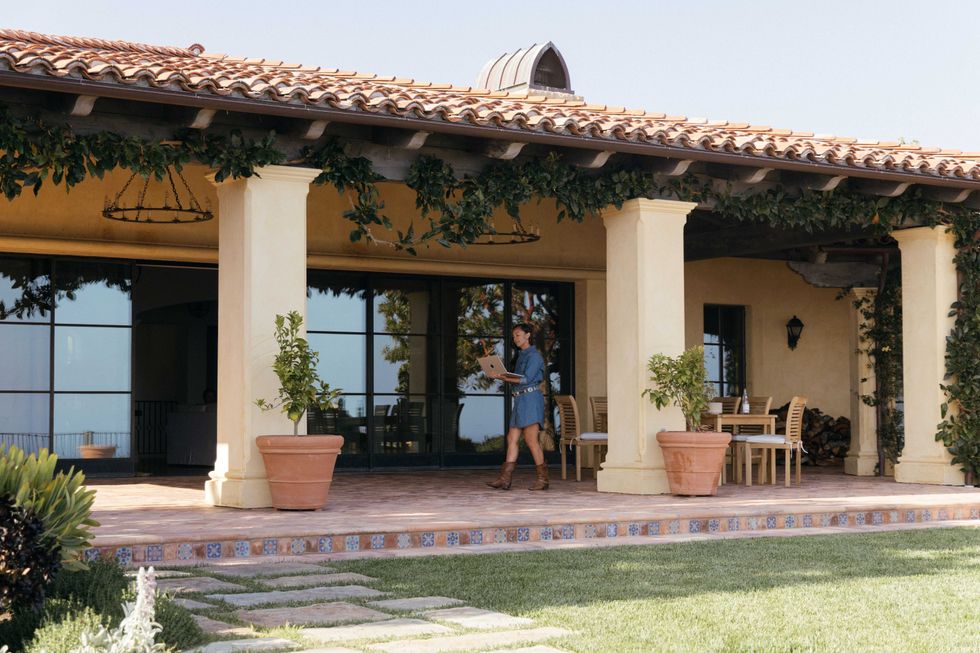
We reseated ourselves at a table away from the mountain sunset glare. I stationed myself beside Nicole this time; she had something to show me on her laptop. I read off the title slide.
“Global Treatise on Natural Living.”
Nicole had given this presentation a few days prior to Stanford University biotechnology graduate students.
“The inherent dignity of all human beings includes the freedom to choose lifestyles that align with our values, traditions, and beliefs,” she read from the next slide. “Living naturally is defined as maintaining practices that prioritize minimal reliance on advanced technology, harmony with the environment and adherence to cultural or spiritual traditions fosters human well being, cultural diversity, and ecological sustainability.”
Nicole’s treatise borrowed from the Amish concept of Ordnung, which determines the permissibility of a given technology, as well as negative rights, the principle governing that which cannot be done to you by government, its proxies, or other entities or individuals.
For example, the right to natural living would mean you have the right not to be forcibly medicated, injected, treated, chemicaled, or otherwise made to live unnaturally by your standards.
Like the Digital Bill of Rights popularized by Scott Adams, a right to natural living was unforeseen by America’s Founding Fathers and their immediate successors; it’s like the right to breathe air, joked Nicole herself. Whether the platform causing harm is social media from Big Tech or mRNA from Big Pharma, we need a right to relief.
Just make it stop.
“You wouldn’t know if this was a right-wing or a left-wing thing,” Nicole said, coasting through more slides for me. “It defines the right to live naturally as an inalienable freedom of individuals and communities to adopt and maintain lifestyles that reduce the need for digital systems and biotechnology. So you would have a right to, for example, reject an mRNA vaccine. You would have the right to real, true medical freedom. You would have a right to live under skies that are not engineered. You would have a right to live in a home using whatever system you want. You’d have a right to drive an oil or a gas car, the right to collect your own rainwater and use that. This is about harmony of nature.”
Nicole scrolled through several more slides. So much more came up: the social contract and the sanctity of life; ethical biotechnology; demonic as opposed to spirit-filled AI systems; and Nicole’s spiritual practice. So much more. She’d answered all the questions I’d asked, one way or another, or did one better—she responded to questions I hadn’t asked.
Yet there was still so much to see.
The others, led by Jacob, had gathered around us. Michael suggested a tour of the grounds. The ranch’s wilds beckoned. Soon, I’d see them reveal more than words could say.
Nicole drove us forwards, backwards, up, and down. Michael snapped pictures from his perch riding shotgun like a safari filmmaker. Nicole’s stylist squeezed between Jacob and me in the back seat.
“I think about government in a maternal and paternal way. Maybe that’s my progressive Democratic roots, but I do think about it like a family. Americans—we are a family. Some of us were born here. Some of us worked very hard to immigrate to be part of this family. There is a contract that you care for one another. You take care of your home. You clean up after yourself. There’s a mutual respect based on how long you’ve been there,” Nicole said. “If you are elected to be a leader, a parent, you’re overseeing your constituents. You’re responsible for the family. It’s actually a form of negligence to neglect your own family to provide resources to somebody else’s family members. We have laws in this country that state that our elected officials are responsible for their constituents, their well-being, and their public goods. Like water. Air. Soil.”
There was a very special destination Nicole wanted to show us. Something she’d just found growing naturally on her land, sustainably, without any human intervention at all. I wondered what it could be.
“Look! Sheep!” I pointed out. “There’s a cluster of them on the hill. Right up there.”
“Nature’s lawnmowers,” Nicole said. “It’s a good thing they eat all this mustard weed. Otherwise it turns into this brittle stuff, which is kindling. For fire management, you do need animals on the land. That’s been California’s biggest stupidity.” She shook her head at the mustard weed that had not yet been grazed away. “They’ve turned our state’s rangeland into this shit.”
Jacob then enlightened us about a known NGO scam. Environmentalists demand that a particular tract be conserved. Fair enough. Millionaires donate to purchase it for the nonprofit. But the environmentalists run out of money to maintain it. Theydon’t know how to actually nurture nature, so they sell it to the state for cheap. But the state doesn’t have a business model for the given tract or the budget to care for it. So upgrows the literal and metaphorical mustard weed, sparks fly, and neighborhoods burn, people flee, and animals get sick.
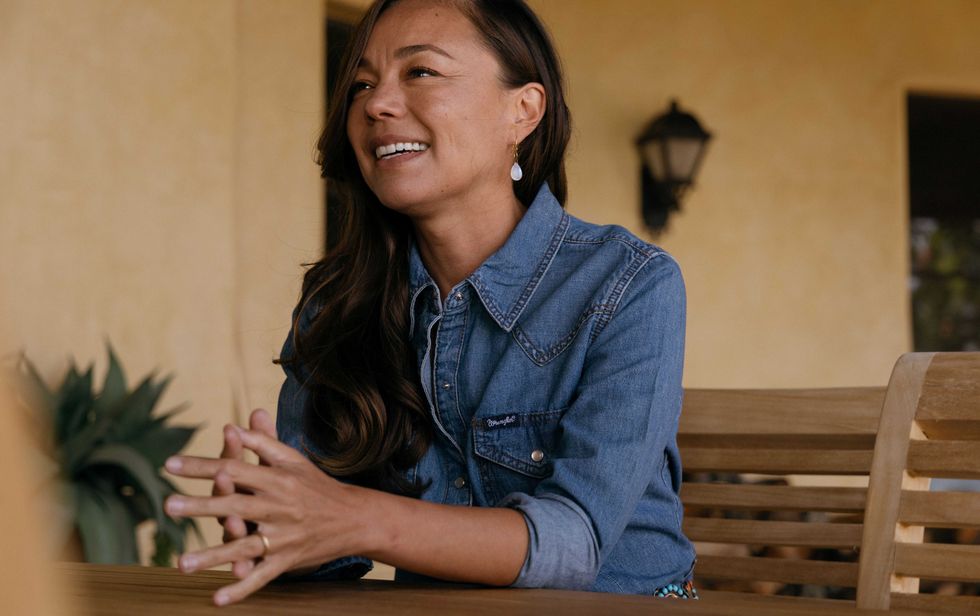
Nicole added a disturbing anecdote about the recent Los Angeles wildfires’ impact on local honeybees. Just make it stop.
“Let’s stop here,” Nicole said. And we did. All of us got out of the four-wheeler, and I shadowed her on the rocky walk uphill. The sheep had been here, I could see.
Nicole led us to a lonely tree by the ravine.
I’d never seen an avocado tree before.
It’s one of those entities you presume exists but don’t usually ever see. Like maple tree sap before it’s boiled into syrup, or those special printing presses that make our passports. You see something like this up close for the very first time and think, Wow. Huh.
“Can a plant exist and thrive and produce food without irrigation and constant maintenance?” she hypothesized. I followed her up the rock-soiled hillside. “The avocados we get from Mexico, they’re horribly covered in pesticides and chemicals, and the soil is mutated and manipulated.”
I didn’t know I’d be receiving an education on natural living.
Nicole continued: “Can we feed our population without using agrochemical input? Can nature provide for us? And then you walk up under this...”
Here we were. A guacamole canopy. A fertile, beautiful avocado tree above. The boughs, bark, and branches reminded me of evergreens back in Ohio.
I reached up and ran a gentle finger over the firm ridges of an avocado. Just like young pine cones, it didn’t budge from its hold.
I glanced higher and farther. Avocados—they’re everywhere—guac rocks of all sizes.
I looked back at Nicole. She beamed with gratitude you can’t fake; she had an ear-to-ear smile, like a child on her birthday.
“What do you think a tree like this yields as far as avocados?” asked Michael. I like how he clarified which fruit.
“Three hundred to four hundred a year,” Nicole said. “But no inputs. Just nature.”
“It’s really old,” said Jacob from a few paces away but within earshot. “Has to be more than a century.”
At that moment, something else caught my eye. Opposite the tree, across a nearby ravine, stood a row of flowering bushes.
“And these are elderberries,” Jacob said. Also naturally occurring.
“Yes. It’s just nature doing her thing. It’s California.” Nicole nodded. “Elderberry is what you need to defeat cold season, and it’s just growing native. It’s the best. We’re so lucky we can just grow our own food. And nature wants us to. It really does.”
It does. I looked back at Nicole and smiled.
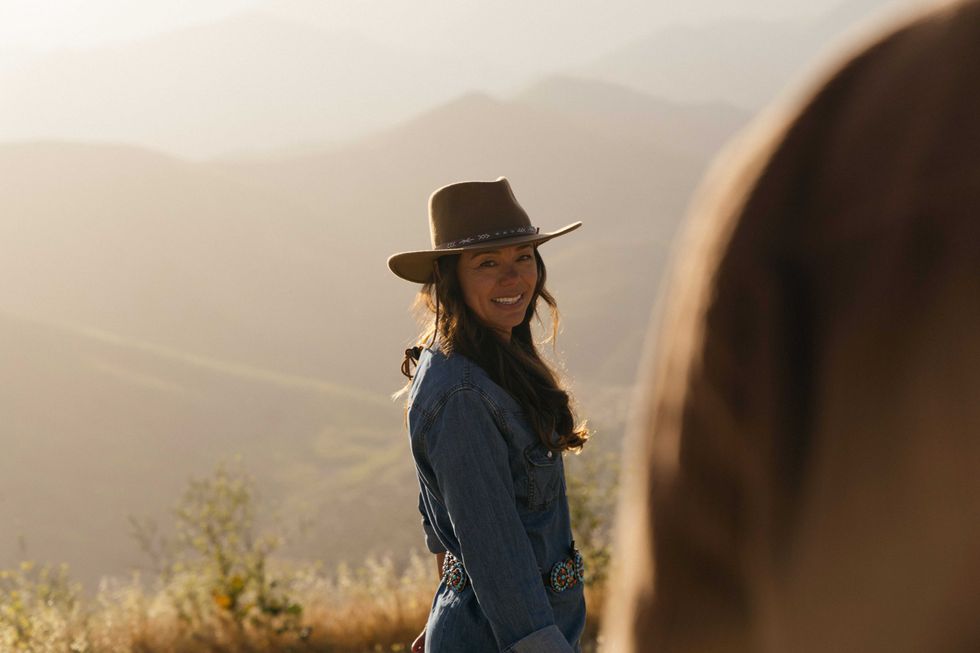
“Discovering food that you didn’t even put effort into tending and has just been doing its thing, as a complete mystery to everybody else...” she trailed off into a warm, happy sigh.
On the four-wheeler trek to the tree, Jacob gave me the backstory. When he and Nicole moved onto the mountain ranch, the place needed immediate attention and great care. Most notable was the mustard weed situation. The stuff had grown thigh-high absolutely everywhere, drying, dying, and decaying into that Southern California wildfire kindling. No bueno. So they’d brought nature’s landscapers to bear: a herd of sheep. And now, the entire hillside around the avocado tree lay weed-free. Up higher, towards the top of the hillscape in view, we could squint and see these little puffs of wool doing their thing on the land still covered in wildfire risk.
Avocados, elderberries, and mustard weed. My next few thoughts drifted to the ocean far below us. Sunset crested the mountains. Orange-warm haze above each successive row of peaks flashed back my childhood summers spent in the Great Smoky Mountains of Eastern Tennessee. Then I remembered my backyard—its green apple tree, mulberry tree, black raspberry bushes... all growing wild out of a long-untouched forest.
'We have narrow opportunities to make the right choices in our own lives, and if we're lucky enough, we can help more than just ourselves.'
There is something special, holy even, as you step into the natural cycle of flora and fauna. Not to change it or supplant it or end it, but to play in it. Keep the cycle going. Enjoy it, all of it. And as you occupy that space—as you benefit without effort, nourishing you and your family from nature’s sweet and healthy-fatty abundance—you realize something:
It’s the best.
As the tour moved on, I found myself standing still, staring intently at a little clump of grass. It had moved. It moved again. Jacob, Nicole, and then the rest of us backed away.
“That’s a baby,” Jacob said.
There it went. Side to side, turning in the earth.
A rattlesnake.
“They’re more poisonous because they don’t know how to control their venom,” Michael said of the baby rattler, now scurrying off under the old rusty mountaintop cistern Nicole drove us up here to see.
There was so much more to see from here. Little terraces where orchards and gardens once were, we could see about a thousand feet away. An adjacent canyon, where Chumash artifacts had been found. Their solar array is a significant gap away. That’s where we headed next—winding down, around, and back up again.
Nicole drove. She spoke loudly and clearly over the Honda’s engine. And she drove carefully over each bump, root, and large rock so nobody’s sunglasses slipped off.
Jacob called out the incredible skill of our tour guide. She looked bashful and grateful.
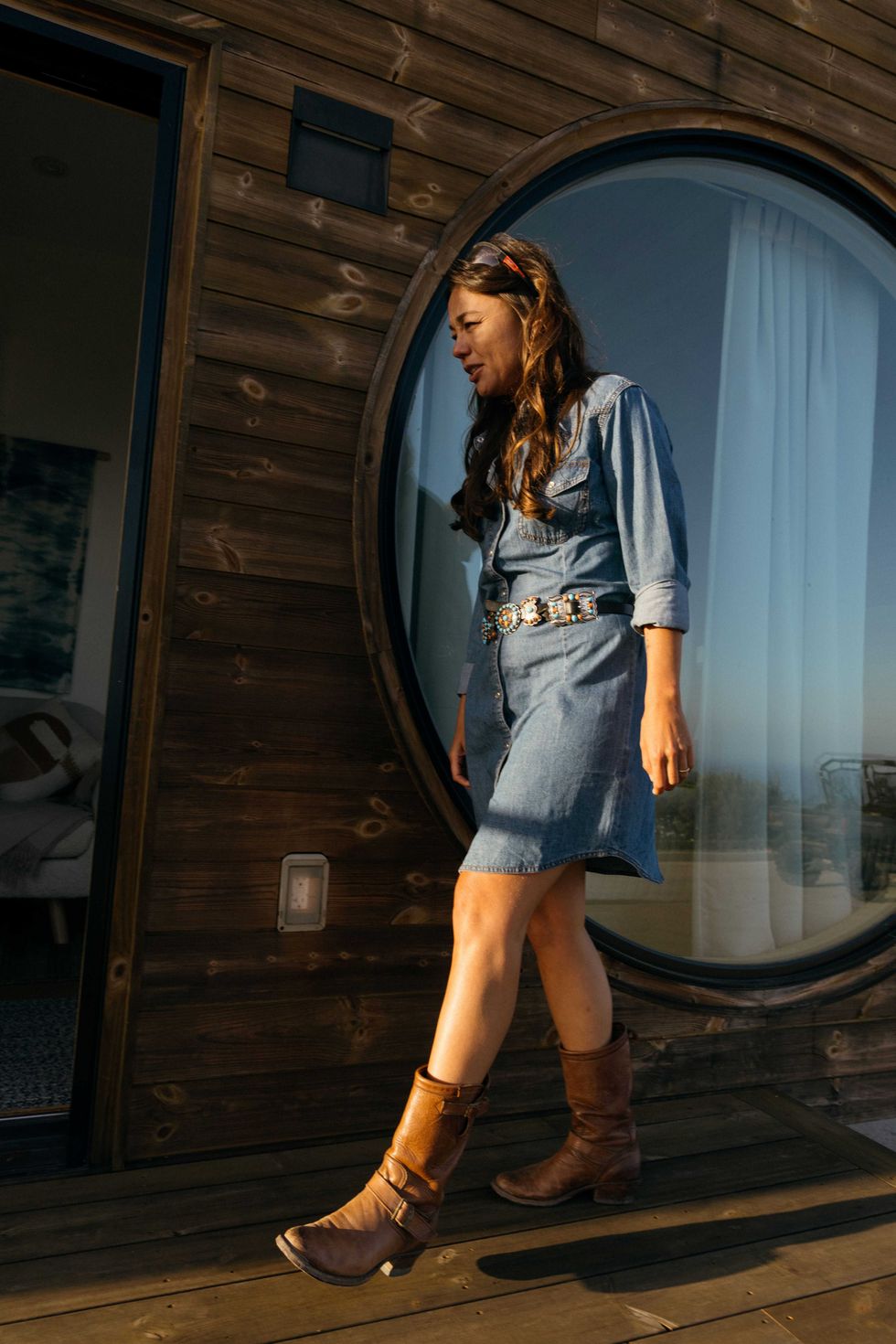
But there was a point when the four-wheeler did neither much forward nor wheeling. We lurched, fell back, sputtered forward again, then slowed. Nicole turned the thing off. We were a ways out now from the house. Sunset slipped below the highest mountains. A ranch is a ranch. It’s not a backyard. You don’t want to be stranded among the snakes with guests in tow after dark.
I got the feeling their patience wore thin with the Honda. But not with each other. A quarrel over the amount of fuel left in the tank as the possible culprit for the vehicle’s odd handling could have ensued. With most people, it probably would have. Jacob was kind and firm in his advice to Nicole on how to handle the four-wheeler; she was open yet direct in her response. It was the most beautiful non-argument I have witnessed a “power couple” have in person. Jacob trusted his instincts; Nicole trusted him, too. He, in turn, trusted her with the wheel.
The tour continued up to the solar arrays, to a mobile tiny home-like structure Nicole had designed herself, to their flowers and hives and more. The honey was delicious. I kept quiet through the last leg of the tour, still thinking about Nicole and Jacob and the four-wheeler.
A couple of days before this California trip, I’d caught an episode of a relationship advice show. The pessimistic host had said—I’m paraphrasing—“I was recently asked if I’ve ever seen a couple whose dynamic I’d like to emulate with my girl. I can’t think of a single one.”
I can now.
Joshua Lisec is the New York Times best-selling author of Unhumans: The Secret History of Communist Revolutions (and How to Crush Them) and Bulletproof: The Truth about the Assassination Attempts on Donald Trump. He lives near Dayton, Ohio, and has three children.
Joshua Lisec